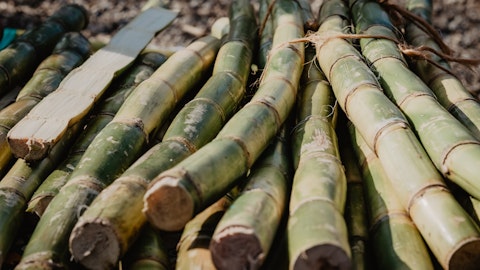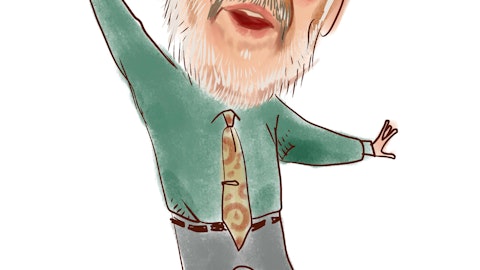Gabriel Barra: Great Luis, very clear. Thank you.
Operator: Thanks. Next question is from Monique Greco sell-side analyst from Itaú BBA. Please go ahead, Monique.
Monique Greco: Hi everyone. Good afternoon. Thank you for answering my questions. Congratulations on your new position. I wish you success. And thank you for the sum of the parts template. It’s very helpful. I have a question about Compass. Could you comment on Edge’s business model, that’s the brand you’ve created to consolidate your marketing and services activities. What led to the company to adopt that model? Why do you think — what kind of benefits do you think it will bring having a brand to consolidate those activities? And what kind of changes can we expect in the way Compass reports its results or guidance because of Edge. And a company about the holding — question about the holding company about capital allocation.
You’ve openly talked about your willingness to buy back shares given the discounts on share prices. But we haven’t seen any buyback records in your current program. So it would be great to hear about how you’re thinking about buybacks. Thank you.
Luis Henrique Guimarães: Hi thanks, Monique, for your questions. Well, Edges’ model is the same thing we’ve done at Move and Risen combustibles in the last year. So understanding the market, segmenting the market, choosing the clients having the ability to distribute having capacity, having a competitive product, infrastructure and the ability to source and meet the demand. That’s basically it. Once things are regulated and conditions are right, then we can go to different places that don’t have the infrastructure or we’ll have it in the next two years. So if you want to think about the kind of business, we’re doing it very similar to moves and raise and combustibles. The only difference is that there is no retail. So it’s a B2B business, but it does cover many different kinds of clients, small stores, large industries, a wide array of clients in a geography that isn’t necessarily in places where we have regulated business where Comed and Comgas operates.
So we know a lot about distribution. We have the capillarity. We now have the molecule with the terminal. The Brazilian market is opening up. There will be molecules from other producers, other suppliers. And the market is hungry for companies that can provide credit, can take risk and select clients price things right and have the right profit, obviously, to provide the vast array of services we will be providing and have started to provide. So Edge will be growing, and there are many different areas. We’re very excited because — it’s not a very competitive market. And we can make the most of our talent as the business grows and we can grow edge and we’ll have more distribution capacity. As for capital allocation, yes, we’re still focusing on potential buyback.
We have reduced our leveraging the re-gas program is still open, and we will execute on it when the time is right. And considering our future commitments and considering the EBIT that was approved by the Board for buyback, we also include our total return swap amount. So you don’t see any buyback, but you do see that
Monique Greco: Okay. Great. Thanks, Luis. Thank you, Lewin.
Luis Henrique Guimarães: Thank you.
Operator: Next question is from Matheus Enfeldt sell-side analyst from UBS. Please go ahead, Matheus.
Matheus Enfeldt: Hi. Good afternoon, Luis and Lewin. Like everybody else, I’d like to congratulate you and wish you good luck in your new positions. In the revision process of the subsidiary assets and the holding company’s stake at Vale. Where are you in the process? Have you already looked at all the opportunities to raise funds or to have a more active portfolio management. Do you think you’ll be leveraging during the portfolio revision process? And a more general question, considering the company’s reach, how do you see the latest changes in regulations and legislation in the industry. The tax reform is an important point, but there’s still a considerable amount of uncertainty. The gas market is developing but there’s still some regulatory obstacles.
So what are your points of concern? What are you looking at more closely? And — as a follow-up question to Thiago and Isa. do partnership role in the management succession process and these recent changes, how do you see that? Will it bring more stability — or will it give the group strategy more longevity
Ricardo Lewin: I’ll answer the first question, Matheus, and then I’ll turn it over to Luis. The way we analyze our portfolio is continues. So we are constantly assessing the portfolio, both at the subsidiaries and the holding company. An example of that, are the acquired companies from Petrobras, five of them, we have announced will be sold as part of our portfolio changes. And we will announce any other changes as they happen. I’ll turn it over to Luis now.
Luis Henrique Guimarães: So let me talk about the regulatory issues. Obviously, the tax reform is one step. We believe it to be a positive thing for the country. The simplification is positive. We are concerned about all the exceptions to the rule. It’s important to the fuels. Obviously, we’re concerned about what was built and what’s being discussed in terms of imports via the Manaus free trade zone when it comes to fuels. And there seems to be a trend to increase taxes in general, and that obviously reduces company’s abilities to invest. But we do believe that the balance between the executive branch, the legislative and the Ministry of Finance will come to a conclusion that will lead to tax balance. The dollar has been helping, inflation rate has been helping.


